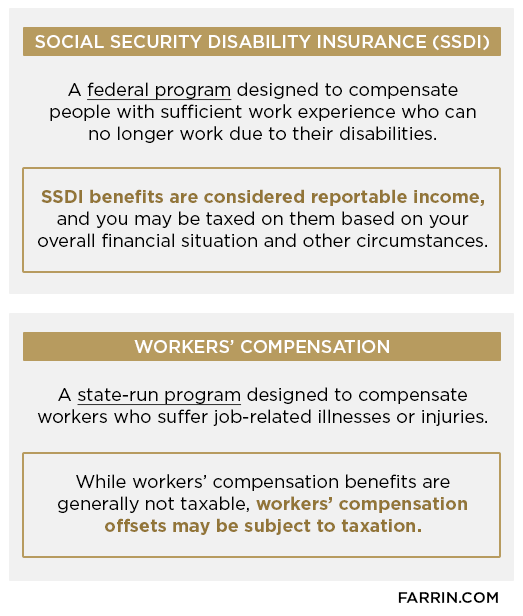As a Disability attorney, a question I hear often from Social Security Disability (SSD) clients who also received workers’ compensation benefits is, “Why does my SSA-1099 form show a higher amount of Disability benefits than I actually received?” The answer to this question involves the coordination of benefits between Social Security Disability income and workers’ compensation income and workers’ compensation offsets.
Sometimes, your SSD benefits are reduced because of the workers’ comp benefits you receive. This is so you don’t exceed the combined total of benefits you’re allowed to receive by law. Because the IRS treats workers’ compensation payments and Social Security Disability payments differently for tax purposes, though, things can get tricky. Workers’ comp benefits are generally not taxable, whereas SSD benefits can be taxable depending on your financial situation.
The amount on your SSA-1099 form is the likely amount of benefits you owe taxes on, not necessarily the amount you received in SSD benefits.
Below, I will provide you with a more detailed explanation and an example to illustrate how workers’ compensation offsets can affect your Social Security Disability benefits. But first, here’s a refresher on some basic terms and facts:
What Is a Workers’ Compensation Offset?
There is a federal requirement that your combined workers’ compensation payments and SSDI payments cannot be more that 80% of your typical earnings before you became disabled. The intent of this requirement is to ensure that the combined benefits are not excessive.
In North Carolina, the Social Security Administration (SSA) reduces your SSDI benefits to meet the 80% requirement – and the amount your SSDI benefits are reduced is called a workers’ compensation offset.
Hypothetical Example:
Bob’s average earnings were $4,000/month before he became disabled, and by federal law, he is only entitled to 80% of this amount (or $3,200/month) in monthly workers’ comp and SSDI benefits:
$4,000 X 80% = $3,200 (maximum allowable workers’ comp + SSDI benefits)
If Bob is eligible to receive $2,000/month in workers’ compensation and $2,200/month in SSDI, for a total of $4,200/month, the combination of both amounts is more than the maximum allowable combined benefits set forth by federal law:
$4,200 – $3,200 = $1,000 (amount over the maximum allowable benefits)
Therefore, the SSA subtracts the workers’ comp amount from the maximum allowable combined benefits, and the remainder is what SSDI will pay:
$3,200 (max amount) – $2,000 (workers’ comp benefits) = $1,200 (what SSDI will pay)
The difference between what Bob was originally eligible for in SSDI and what SSDI paid in benefits is the workers’ comp offset:
$2,200 (orig. SSDI benefit) – $1,200 (what SSDI paid) = $1,000 (workers’ comp offset)
The $1,000 workers’ comp offset amount is taxed by law because it’s helping Bob avoid SSD taxes but was not taxed as workers’ compensation. So, the SSA adds it to the amount that it paid in SSDI, and that total amount is listed in Box 5 (Net Benefits) of the SSA-1099.
$1,200 (actual benefits paid) + $1,000 (workers’ comp offset) = $2,200 (the amount the SSA reports in Box 5 of the SSA-1099 form)
This is why your SSA-1099 form may show a higher amount of SSDI benefits than you actually received. The SSA likely considers this total amount ($2,200 in the above example) to be what you have received in taxable SSDI benefits.
Why Are Workers’ Comp Offsets Subject to Federal Taxes?
They aren’t.
If you get both workers’ comp and Disability, a workers’ compensation offset is basically replacing a portion of the SSDI benefit – so you may not be receiving that in SSDI (and therefore not paying the taxes), but you should still be receiving the full benefits allowed by law. Had there been no workers’ compensation offset, you likely would have had to pay taxes on the SSDI portion above your earning threshold, so the workers’ comp offset amount is subject to taxation.
If you have additional questions regarding workers’ compensation offsets and how they impact your taxes, consult with a tax professional. If you have questions about Social Security Disability benefits, I urge you to consult with an experienced Social Security Disability attorney.
You May Also Be Interested In
Do My Social Security Benefits Get Taxed? And Other Relevant Questions





